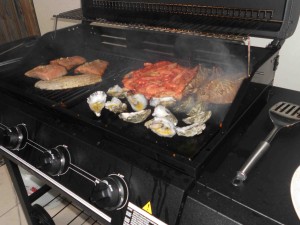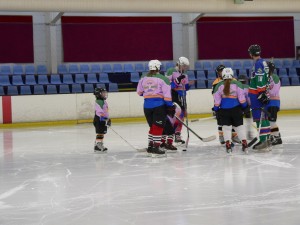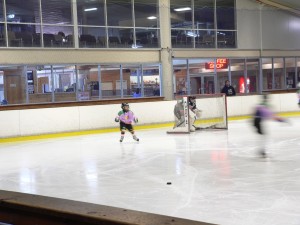We’ll probably do the feast of the seven fishes again this year on Xmas Eve (it’s summer and it’s hot and the seafood is fabulous).
 New South Wales Minister for Primary Industries, Katrina Hodgkinson, said the extra supplies of food typical of Christmas celebrations and the warmer temperatures of summer can be a recipe for disaster.
New South Wales Minister for Primary Industries, Katrina Hodgkinson, said the extra supplies of food typical of Christmas celebrations and the warmer temperatures of summer can be a recipe for disaster.
“The most common bacteria associated with food poisoning is salmonella and statistically salmonellosis notifications follow a seasonal pattern and increase in warmer months,” Ms Hodgkinson said.
“The warm temperatures combined with the excess food over the festive period sitting on the table over long lunches that can be the perfect breeding ground for bacteria.
“Added to that is that great Australian tradition of the Boxing Day leftovers, which can also present an increased food poisoning risk if not prepared and stored correctly.”
Ms Hodgkinson said fortunately, reducing those risks can be fairly simple.
“The NSW Food Authority recommends you follow a few common sense food safety rules – always observe good hygiene and remember to keep it cold, keep it clean, keep it hot and check the labels,” Ms Hodgkinson said.
The key to food safety over the hot Christmas period is temperature control, some handy hints are to:
- Keep your fridge at or below 5°C, use a fridge thermometer to check that the temperature stays around 4 to 5°C
- Make sure you have enough fridge space as fridges won’t work properly when they are overloaded or when food is packed tightly because the cold air cannot circulate
- Freshly cooked food, not for immediate consumption, should have the temperature reduced as quickly as possible, keep food cool in the fridge or an esky
- Hot food needs to be kept and served at 60°C or hotter, if you are reheating left overs ensure they are piping hot.
- Throw out leftovers that have been sitting on the table for more than 2 hours
The Aussies are promoting thermometers; now if only the Brits would.
www.foodauthority.nsw.gov.au/summer.
 I’m coaching hockey and skating, and volunteering as the food safety specialist at Sorenne’s school, as well as at swimming (I don’t get in the pool, my role is to get the boys dressed on time, and make sure kids don’t do dumb things in the pool).
I’m coaching hockey and skating, and volunteering as the food safety specialist at Sorenne’s school, as well as at swimming (I don’t get in the pool, my role is to get the boys dressed on time, and make sure kids don’t do dumb things in the pool).


